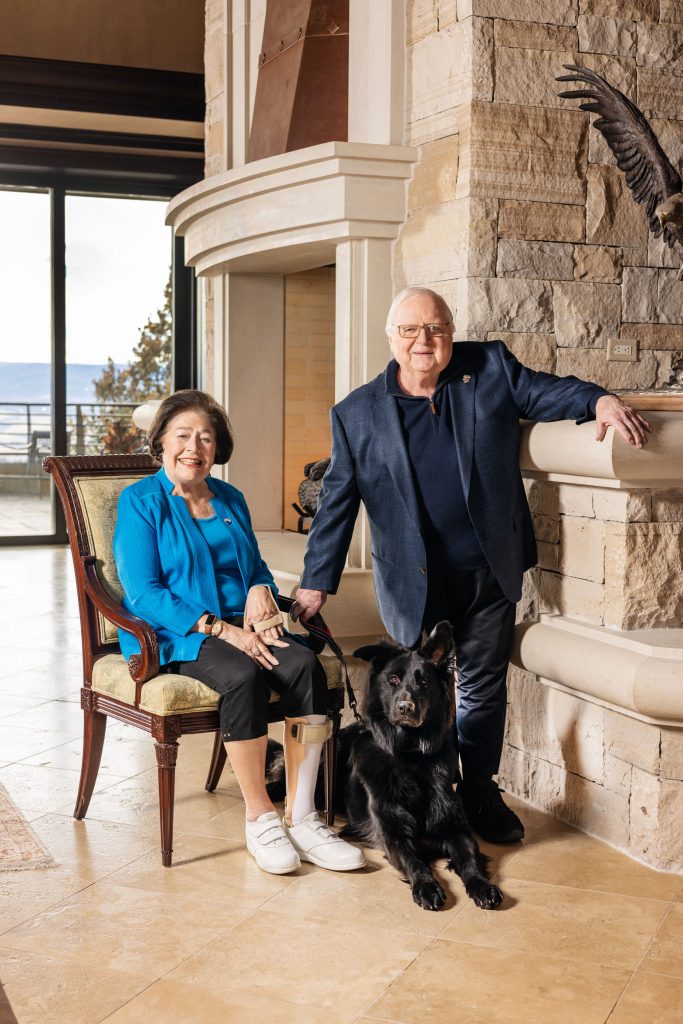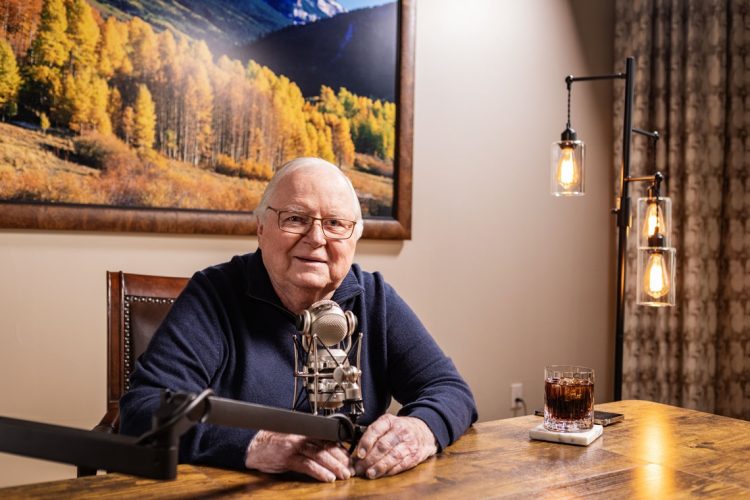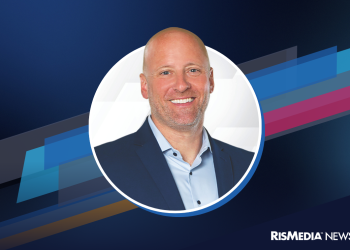RE/MAX Co-Founder Dave Liniger. Photography by Michael Weschler.
Bold. Wise. Wildly successful—all apt ways to describe real estate icon Dave Liniger. In his latest book—”The Perfect 10: 10 Leadership Principles to Achieve True Independence, Extreme Wealth, and Huge Success”—the RE/MAX co-founder recounts many pivotal moments over the course of his storied career in order to provide meaningful lessons for fledgling entrepreneurs, allowing them to learn from both his successes and his mistakes.
Liniger recently joined RISMedia Founder & CEO John Featherston and myself to discuss “The Perfect 10” as well as what lies ahead for the industry in today’s turbulent times. No matter what the future holds, however, it can be used to one’s advantage. As Liniger says, “Courage comes from confidence. Confidence comes from experience. And so the longer you’re around, the more experiences you have, the more things that you’ve overcome, the more courage you have to face whatever’s coming at you the next day.”
John Featherston: Your story has been told many times. What made you sit down and write The Perfect 10?
Dave Liniger: I think that we all leave a legacy of some sort. And my most important legacy business-wise is the company. RE/MAX started as a dream, with no capital, and ended up the largest, most successful (real estate firm) in the world. Lots of people helped me along the way. I got a great partner in Gail. She brought talents that I did not have. We made a lot of amateur mistakes, but we just wouldn’t quit.
When we first started, the big companies were the bad guys. They did not want us to succeed, because if we did, they’d have to pay their top producers differently. We lived through that time period and, along the way, hundreds if not thousands of people have mentored, taught, trained, made suggestions and been kind enough to make the trail easier for us to continue going forward.
And that’s what this book is about—learning from the mistakes of others. You can’t possibly live long enough to make them all yourself, and if you can learn from them and not make the same mistakes, you won’t have that much of a headwind. There are ten major parts to the book and ten ideas in each part. When you invest your time in reading a book or listening to a motivational speaker, all you have to do is get one good idea and it can change your entire life.
John Featherston: In the book, you talk about the REALTORⓇ ABCs—the traits of success. What should agents and teams be doing now to be successful in today’s real estate environment?
Dave Liniger: ‘A’ activities for a residential agent are showing properties, making listing presentations, specifically person to person, face to face. The ‘Bs’ lead the money—making contact with banks, trying to farm an area, trying to come up with a newsletter to stay in contact with your clients for the rest of your career. And the ‘Cs’ are the necessary evils. What we found out was that the Cs are the easiest and fastest to do: I’ve got to get my car washed and a tank of gas because I drive people around in my car. And then I’ve got to pick up my dry cleaning and drop the kids off to school. You go through these Cs, one after another, and at the end of the day, you haven’t made any money at all.
The job is facing the consumer—selling a product and becoming a trusted advisor. It’s just as true today as it’s ever been…you just can’t sit back and say, ‘I’m going to do digital marketing and leads are just going to pour in’ because we know the vast majority of digital marketing leads are worthless. It still comes back to the same thing: past customers, repeat customers, referrals from friends and neighbors, and those individuals that like the service you give. So anybody that’s in the business, you’ve got to look at it every single day and ask, how much of my time did I spend on As and Bs because that’s the only place the money is.
John Featherston: As the chairman of the board for RE/MAX, you made a bold decision in settling the Burnett commission lawsuit. Why did you settle that lawsuit and what’s the result?
Dave Liniger: Because the downside was so great. I honestly believe RE/MAX was not guilty of anything that’s in the claims. I think some of the claims are erroneous—and if it gets to appeal, I think it’s a possibility some of it will be turned over—but I made a logical decision. If I still owned 100% of the company, I probably would’ve stayed in. But I started thinking, we’re a public company—half the company is owned by outsiders and their stakeholders. We have a fiduciary responsibility. I’ve got 9,000 offices around the world and most of them, their biggest asset is the real estate company they’ve got. And we’ve got 140,000 plus agents. I thought, I don’t have the moral right to gamble all of their money after they worked so hard for five, ten, 40 and 50 years. So to me, settling was a logical circumstance at the right price, and I’m glad we made the decision. In the epilogue, I mention that we probably won’t know whether I was right or wrong for several years. But it was the right thing, morally.

Maria Patterson: Dave, this book became such a wonderful way for you to tell some of the fabulous stories about the creation and the growth of RE/MAX. Why was it important for you to do that, and why do you think it’s important for readers to have those really candid stories about your own success?
Dave Liniger: People look at people who’ve become inordinately successful and there’s a wow factor of, ‘I could never do that.’ That’s not true. Most people have far more capabilities than they think they have. Courage comes from confidence. Confidence comes from experience. And so the longer you’re around, the more experiences you have, the more things that you’ve overcome, the more courage you have to face whatever’s coming at you the next day.
When I was totally paralyzed for several months, I kept in my mind that I was not going to quit. One night I felt like it, but I said to myself, you’re a hypocrite. You can do anything you want. I’ve had all these great successes and my share of failures, but I’ve always gotten back up to fight one more round. And I said, if I’m going to be a quadriplegic, I’ll be the best damn quadriplegic there’s ever been. I told the nurses and the therapists, work me harder than any patient you’ve ever done. I may cry and I may hurt, but do not let me fail. I won’t give up on myself if you don’t give up on me. And they did and it paid off. Experience builds confidence. Confidence builds courage. That’s what this book is all about.
Maria Patterson: I love how you talk about the intensity of desire—you refer to it as “opening night excitement.” How does anyone manage to maintain that type of desire over a decades-long career?
Dave Liniger: You build on each success you get. If I had stayed just selling houses for 50 years, I think I would’ve burned out.
The more challenges that we came up with and the broader we looked into the business, the more interesting the business became. When we made the decision 25 years ago to have a satellite television training system, that was a brand new challenge for me. I knew nothing about electronics and I knew nothing about video. So we threw ourselves into it and had a new challenge. And the 2007 financial crisis—all of a sudden, it was foreclosures and short sales. We threw ourselves into it better than any company out there.
And in addition to challenges, I chased all my adventures. I’ve done all these things like skydiving and NASCAR racing. I’ve succeeded at all of them because I knew how to build the team. This is all about building teams.
John Featherston: You talk about success as doing what you really want to do with the people you want to do it with. Does that personify Dave Liniger?
Dave Liniger: I think it does. If you’ve ever noticed, I probably have surrounded myself with nicer people than most business people have. I think really, since I was hurt, I’ve looked at the world a little bit differently. And then life’s too short. I get requests hundreds and hundreds of times a year—come speak for us, be involved in this project, we need your endorsement for this charity. I know that my remaining days are limited. And so if I don’t look at it with a passion and say, hell yes, then I’m going to say, no thank you. I want the ‘hell yes’ experiences. I want to accomplish something. I want to leave a legacy. I think Steve Jobs said it best at Apple—they said no to the good so that they could put all their efforts into a few items that were excellent.
John Featherston: In the book you mention that David can slay Goliath. Can David still slay Goliath in today’s environment in our industry?
Dave Liniger: Yes, no doubt about it. You can look at some of the up and coming companies and you can see a lot of them have good growth. I’ve also said sometimes you have to be around long enough to fail, but companies come, companies go. The world continues to evolve. So for anybody to succeed, you can’t do today’s business with yesterday’s methods and expect to be in business tomorrow.
For more information, please visit https://www.amazon.com/Perfect-10-Leadership-Principles-Independence-ebook/dp/B0CM44XTS1.












